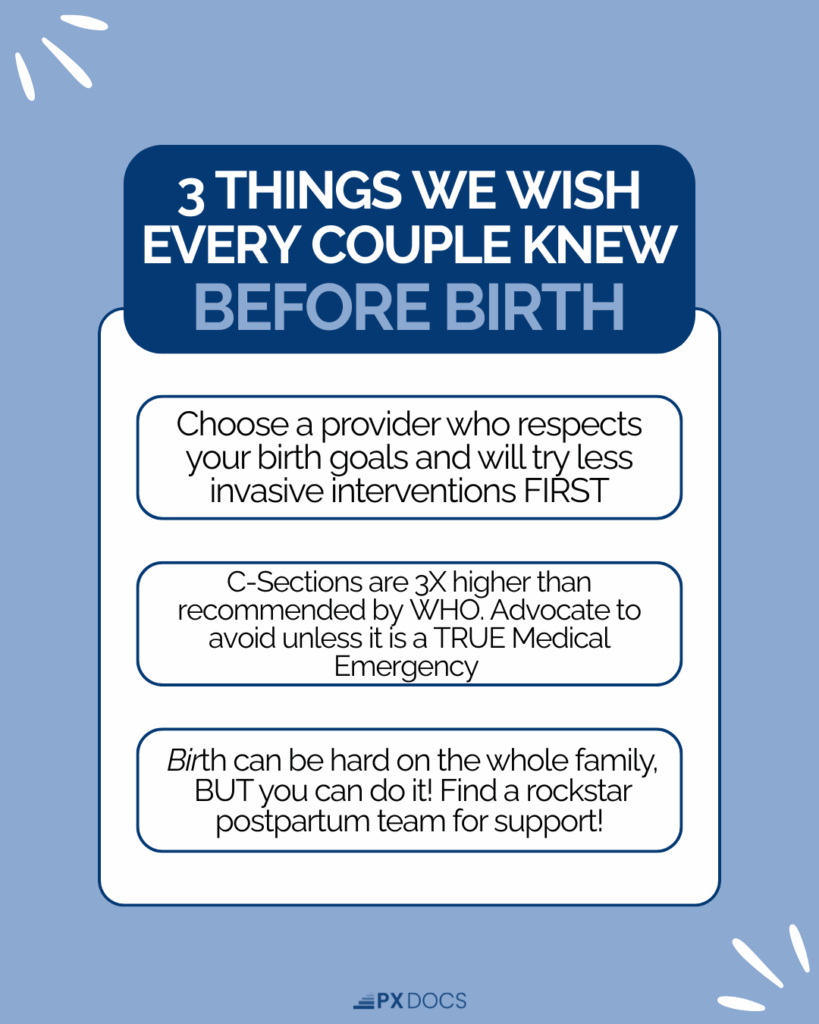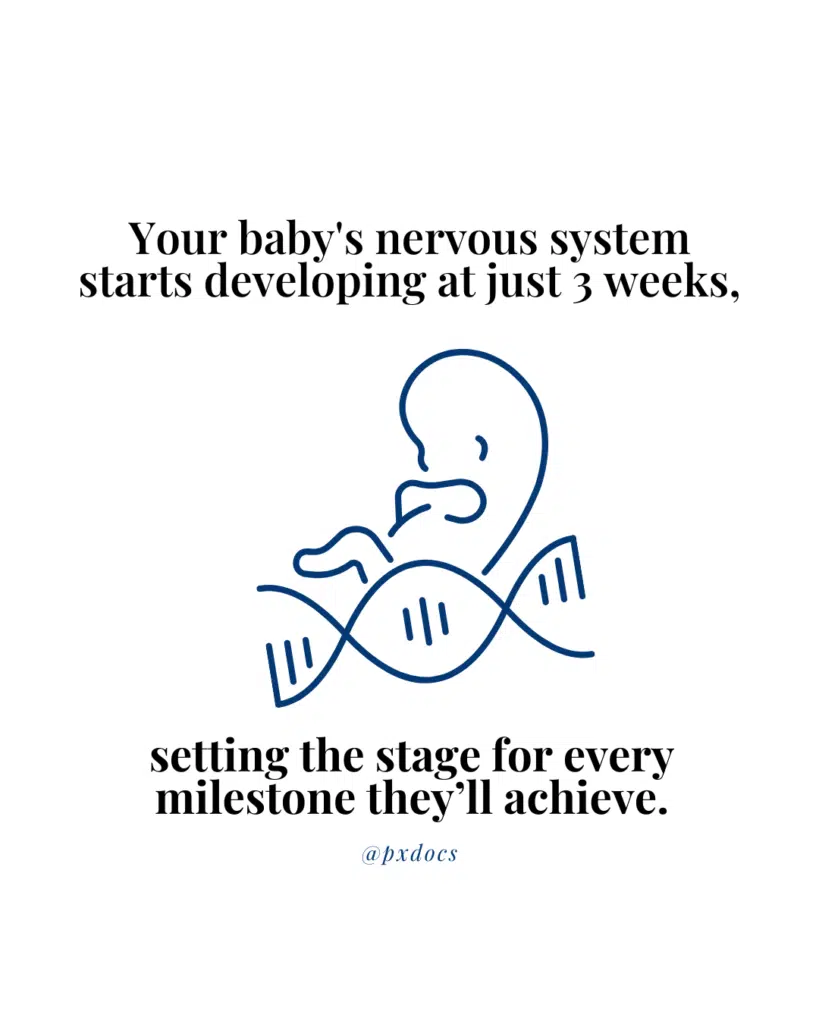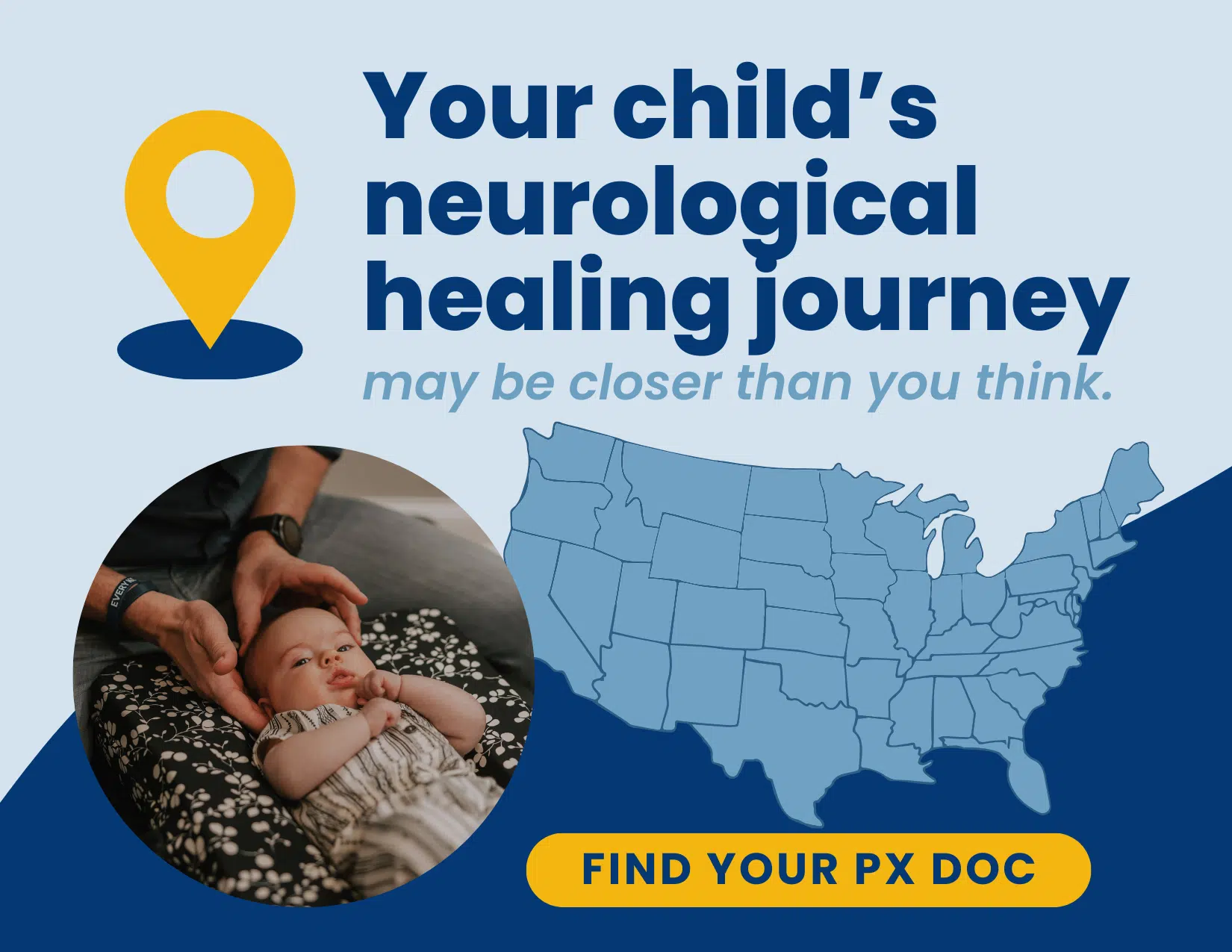As parents, we want nothing more than to see our children healthy, happy, and thriving. However, in today’s world, it seems like more and more children are struggling with chronic health issues, from allergies and asthma to ADHD and Autism. Despite our best efforts to provide a nurturing environment and make healthy choices, sometimes we find ourselves feeling overwhelmed.
What if there is something missing that could help us potentially help our child’s development even before conception? That missing piece may be found in the nervous system. Studies indicate that 17% of children experience nervous system dysregulation.
At PX Docs, we understand the critical role that the nervous system plays in every aspect of your child’s growth and development. We also recognize that there are numerous interventions and factors that come into play. We call this the “Perfect Storm,” which can disrupt nervous system development and set the stage for future health challenges.
In this article, we’ll dive deep into the world of neurodevelopment, exploring ways to help support your growing baby’s nervous system and do everything you can to grow a happy, healthy baby from preconception through early childhood. Along the way, we’ll share insights, strategies, and resources to empower you as you are figuring out the journey called parenthood.
Understanding the “Perfect Storm”
In recent years, prenatal care and childbirth have become increasingly medicalized, with interventions and complications becoming more common. Consider these alarming statistics:
- The United States spends over $50 billion on childbirth each year
- 1 in 3 American women undergoes a cesarean section (C-section), despite the World Health Organization recommending a rate of 10-15% at most
- 70-75% of American women receive an epidural during labor
- 25% of women have their labor induced
While medical interventions can be life-saving in true emergencies, the overuse of these procedures can have unintended consequences for both mother and baby. This is where the concept of the “Perfect Storm” comes into play.
The “Perfect Storm” refers to a combination of factors that can disrupt the balance of the nervous system during the prenatal period and early childhood. These factors include:
- Prenatal stress: Studies have found that maternal stress during pregnancy can have a profound impact on fetal development, altering the programming of the brain and nervous system, and increasing the risk of future health challenges.
- Birth trauma and interventions: Complications during labor and delivery, such as prolonged labor, forceps or vacuum extraction, or C-section, can cause physical stress and trauma to the infant’s delicate nervous system.
- Early childhood stressors: Early exposure to antibiotics, other environmental toxins, poor nutrition, and emotional stress in the early years can further compromise a child’s neurological development.
When these factors combine, they can create an effect on child health and development, setting the stage for a wide range of chronic conditions, such as allergies, asthma, ADHD, Autism, and more. By understanding the “Perfect Storm” and its potential impact, parents can take proactive steps to support their child’s neurological health from the very beginning.

The Nervous System: The Foundation for Growing Healthy Babies
To understand how the nervous system impacts your child’s health and development, it’s essential to grasp the basics of its structure and function. The Autonomic Nervous System (ANS) is responsible for regulating involuntary functions like heart rate, digestion, and stress response. It consists of two main branches:
1. The Sympathetic Nervous System (SNS): Often referred to as the “fight or flight” response, the SNS is activated in times of stress or perceived danger. It prepares the body for action by increasing heart rate, blood pressure, and muscle tension.
2. The Parasympathetic Nervous System (PNS): Known as the “rest, regulate, and digest” response, the PNS promotes relaxation, healing, and restoration. It slows heart rate, enhances digestion, and supports immune function.
In a healthy individual, the SNS and PNS work together, allowing the body to respond appropriately to different situations. However, when this balance is disrupted—often as a result of the “Perfect Storm” factors discussed earlier—it can lead to a state of chronic stress and nervous system dysregulation.
One of the key players in maintaining this balance is the vagus nerve. As the longest cranial nerve in the body, the vagus nerve acts as a main line of communication between the brain and major organs, including the heart, lungs, and digestive tract. It plays a crucial role in activating the PNS and promoting relaxation and healing.
The Role of HPA vs. HPG
Nervous system dysregulation can have a profound impact on fertility and pregnancy. When the body is stuck in a state of chronic stress, with an overactive SNS and underactive PNS, it can disrupt the hormonal balance necessary for conception and healthy fetal development. This is where the concept of the HPA (hypothalamic-pituitary-adrenal) axis vs. the HPG (hypothalamic-pituitary-gonadal) axis comes into play:
- The HPA axis is activated in times of stress, releasing cortisol and other stress hormones that can interfere with reproductive function.
- The HPG axis, on the other hand, is responsible for the production of reproductive hormones like estrogen, progesterone, and testosterone.
When the body is in a state of chronic stress, the HPA axis can override the HPG axis, making it more difficult to conceive and maintain a healthy pregnancy. This is why prioritizing nervous system regulation and supporting the “Brake” (PNS) is so crucial for growing healthy babies.
Nurturing a Balanced Nervous System During Pregnancy
As a pregnant mama or one who hopes to be soon, prioritizing your nervous system is one of the most powerful ways to support your baby’s healthy development. Research has shown that there is a deep connection between the maternal and fetal nervous systems, and stress can affect the fetal autonomic and central nervous systems.
This connection, known as co-regulation, highlights the importance of maintaining a balanced nervous system throughout preconception and pregnancy. One key measure of this balance is Heart Rate Variability (HRV), which reflects the body’s ability to adapt to stress and change. High HRV indicates a well-functioning nervous system, while low HRV may suggest a state of chronic stress or dysregulation.
Throughout pregnancy, your baby’s nervous system undergoes a remarkable transformation, with each trimester bringing new milestones and developments:

First Trimester:
- Week 3: Nervous system begins to form
- Weeks 5-8: Major organs develop
- Week 6: Sympathetic nerves (involved in social development) begin to form
Second Trimester:
- Weeks 13-16: Bones and muscles develop
- Week 17: Cerebellum begins to form
- Week 26: Vagus nerve myelination occurs
Third Trimester:
- Weeks 29-32: Immune system develops
- Weeks 33-36: Rapid brain development occurs
- Week 37: Autonomic Nervous System fully develops
- Week 40: Vagus nerve and immune system mature
However, when the balance of the nervous system is disrupted—often as a result of subluxation and dysautonomia—it can impact fetal development and increase the risk of complications. Subluxation, or misalignment of the spinal cord, can interfere with proper nervous system communication, while dysautonomia refers to an imbalance between the sympathetic and parasympathetic branches of the ANS.
Some potential effects of subluxation and dysautonomia during pregnancy include:
- Hormonal imbalances and fertility challenges
- Heightened stress response and difficulty relaxing
- Impaired blood flow to the placenta
- Suboptimal fetal positioning (e.g., breech or transverse)
- Increased risk of complications during labor and delivery
By understanding the intimate connection between your own nervous system and your baby’s development, you can take proactive steps to promote balance and resilience throughout pregnancy.
The Role of Maternal Stress on Fetal Autonomic Nervous System Development
Maternal health is a major factor when it comes to fetal nervous system development, particularly the state of the mother’s autonomic nervous system and vagus nerve. The umbilical cord serves not only as a pathway for nutrients and oxygen but also as a “power cord” that connects the mother’s nervous system to baby’s. This means that the developing baby also feels any stress or emotional challenges experienced by the mother during pregnancy.
Research has shown that high levels of maternal stress, such as the loss of a loved one, job-related stress, relationship difficulties, or exposure to natural disasters or socioeconomic disruption, can alter fetal neurodevelopment and lead to various health challenges later in life. When a mother experiences chronic stress, her sympathetic nervous system is constantly activated, and this stress is transmitted to the growing baby via the umbilical cord.
Given the profound impact of maternal stress on fetal nervous system development, it is essential for prenatal care providers to prioritize stress management and emotional well-being. By addressing these factors, chiropractors can help create a more favorable environment for the developing baby and promote optimal neurodevelopment.
Tools for Growing Healthy Babies
Obviously, we can’t control everything, but we can set our bodies up to be the most educated, resilient, and adaptable to anything that is thrown our way. During preconception and pregnancy, we have the power to create an environment that supports baby’s optimal development from the very beginning. One of the most important steps you can take is to educate yourself and prepare for the journey ahead.
Start by prioritizing preconception care for both partners. This involves optimizing your physical, mental, and emotional health through proper nutrition, exercise, stress management, and nervous system support. By laying a strong foundation before conception, you can increase your chances of a healthy pregnancy and a thriving baby.
As you navigate pregnancy, surround yourself with a supportive birth team and environment. Choose healthcare providers who align with your values and priorities, and who will empower you to make informed decisions about your care. Consider working with a midwife, doula, pelvic floor PT, IBCLC, alongside your prenatal chiropractor, as well as other birth professionals who can provide guidance and advocacy throughout the process.
The PX Docs Approach of Neurologically-Focused Care
One of the most transformative tools for promoting nervous system balance during preconception, pregnancy, and beyond is Neurologically-Focused Chiropractic Care. This specialized approach goes beyond traditional chiropractic by focusing specifically on the relationship between the nervous system and overall health.
As PX Docs, we use state-of-the-art technology called Neurological INSiGHT scans to assess the function of your nervous system and identify areas of subluxation and dysautonomia. This detailed analysis allows us to create personalized prenatal care plans and provide targeted Neuro-Tonal adjustments that promote balance and resilience.
The benefits of Neurologically-Focused Chiropractic Care for expectant mothers and babies are far-reaching, including:
- Improved nervous system function and adaptability
- Reduced stress and tension
- Enhanced immune function
- Optimal fetal positioning
- More efficient labor and delivery
Beyond chiropractic care, building a strong network of support is essential for growing healthy babies. Seek out resources and community groups that align with your parenting philosophy, and surround yourself with positive, encouraging influences. The power of a nurturing, supportive environment cannot be overstated.
Supporting Your Baby’s Neurological Health
The journey of growing a happy, healthy baby doesn’t end at birth. In fact, the first few years of life are critical for laying the foundation for lifelong health and well-being. One of the most important steps you can take as a new parent is to prioritize your baby’s neurological health through early assessment and intervention.
We recommend that all babies receive a thorough neurological evaluation as soon as possible after birth. This allows us to identify any potential areas of concern and develop a personalized care plan to support optimal development.
Chiropractic care plays a vital role in promoting healthy nervous system function in infants and young children. Through adjustments, we can help alleviate the effects of birth trauma and promote overall neurological balance.
The most powerful tool for supporting your baby’s development is the bond you create through connection. Nurturing this bond through co-regulation and responsive parenting greatly impacts their neurological health and emotional well-being. By having a regulated nervous system as a mom, you help regulate your baby’s nervous system, encouraging calm and resilience.
Encouraging Your Child’s Full Potential
As you continue on the incredible journey of parenthood, remember that you have the power to shape your child’s health and happiness from the very beginning. By prioritizing nervous system balance, surrounding yourself with supportive resources and care providers, and nurturing a deep connection with your child, you can encourage and support their full potential for a life of optimal health and well-being.
As PX Docs, we are passionate about empowering parents with the knowledge, tools, and support they need to grow healthy babies. Our Neurologically-Focused approach is grounded in the latest scientific research and clinical expertise, and we are committed to partnering with families every step of the way.
If you are ready to take a proactive approach to your child’s health and development, we invite you to visit the PX Docs directory to find a practitioner near you. From preconception care and prenatal support to pediatric chiropractic and beyond, we are here to guide you on this transformative journey.
Together, we can create a brighter, healthier future for the next generation.





